Well warmed up for a new personal best


Warming up prepares the body for the upcoming exertion, reduces the risk of injury, and improves athletic performance. However, an excessive warm-up can also be counterproductive. Especially for competitions, many runners warm up extensively to ensure they are optimally prepared. The line between "too much" and "just right" is a fine one.
NZZ.ch requires JavaScript for important functions. Your browser or ad blocker is currently preventing this.
Please adjust the settings.
Warm-ups usually follow a typical structure divided into several phases. It helps to develop a consistent routine and apply it not only in competition but also during more intense training sessions. Such routines can improve performance because they help focus energy.
They run automatically, no longer requiring conscious attention—and help reduce pre-start nervousness. Of course, the procedures must be adapted to weather conditions or the time of day without making any fundamental changes.
A proven warm-up program can be divided into four phases:
- General warm-up (five to ten minutes): easy running, then slightly increasing the pace toward the end. This increases core body temperature and muscle blood flow, preparing the cardiovascular system for the exertion.
- Dynamic stretching (five to ten minutes): Actively move joints and muscles—feet, legs, hips, upper body, and arms. Prolonged static stretching (over ten seconds) reduces muscle tone too much and is rarely recommended today.
- Specific warm-up (ten to fifteen minutes): Running ABC, coordination and acceleration runs activate the central nervous system and improve the reaction and contraction ability of the muscles.
- Mental preparation (about five minutes): Visualize the course, focus on race strategy. This part is often underestimated—but it can be crucial. Many runners perform intense movements or sprints right up until shortly before the start. It would often be more beneficial to calm down and mentally compose themselves.
Maja Neuenschwander is a running expert and former elite athlete. She now works at Swiss Olympic.
An article from the « NZZ am Sonntag »
nzz.ch





